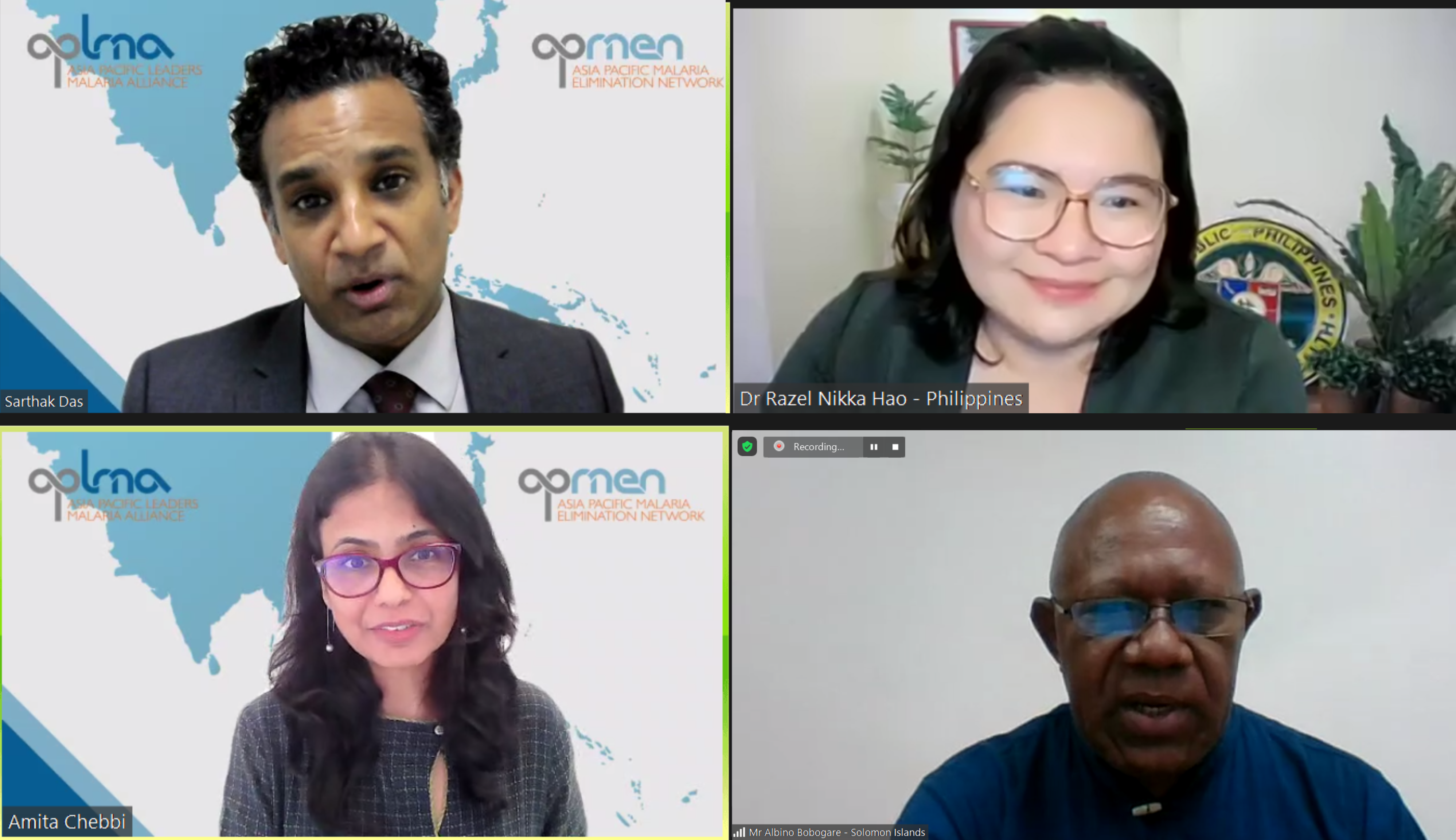
At the 2015 East Asia Summit, the region committed to the goal of an Asia Pacific free of malaria by 2030, endorsing the Asia Pacific Leaders Malaria Alliance Roadmap as a framework to achieve it. The APLMA Leaders’ Dashboard tracks the progress made against the roadmap priorities and highlights key policy challenges that countries need to focus on to get to elimination.
On the 29th of March 2022, we launched the 5th edition of the Leaders’ Dashboard to highlight the progress made towards elimination in Asia Pacific along the six policy milestones of the APLMA Leaders’ Dashboard 2021 whilst also exploring the communities and pockets of the region that require attention. We were honoured to be joined by two guest speakers, Dr. Razel Nikka Hao, Director of Disease Prevention and Control Bureau, Department of Health, Republic of Philippines, and Mr. Albino Bobogare, Director of National Vector Borne Disease Control Programme, Ministry of Health and Medical Services, Solomon Islands. The APMENxChange webinar brought together representatives from Malaria Programs, Ministries of Health, other government agencies and partner organizations, and provided a platform for discussion and feedback on the findings of the Dashboard.
Dr. Sarthak Das, Chief Executive Officer from APLMA, congratulated six Asia Pacific countries that achieved all policy milestones of the dashboard – with Cambodia, Vietnam and Timor-Leste joining the list this year. Other notable progress included, the malaria elimination task forces established in Lao PDR, Nepal, Timor-Leste, and Vietnam, which is are key to keep malaria on national radar, and the elimination financing sustainability plans that have been initiated in Cambodia and Myanmar for resilient malaria elimination service rollouts.
During panel discussion under the theme of “Upcoming Policy Reforms in Asia Pacific to Accelerate Malaria Elimination,” the Directors of National Malaria Programs from the Philippines and Solomon Islands shared their experiences on key initiatives and policy reforms required to improve collaboration across sectors and borders for malaria elimination. The panel discussion was moderated by Ms. Amita Chebbi, Senior Director, APLMA & APMEN.
Dr. Razel Nikka Hao, Director of Disease Prevention and Control Bureau, Department of Health, Republic of Philippines shared about the ‘Integrated Elimination Hub’ established by the Department of Health, covering five diseases – malaria, lymphatic filariasis, rabies, schistosomiasis, and leprosy.
“There has been significant attention to the integration of malaria and filariasis together because the data has shown that these two diseases are endemic in the same area with the same mosquito vector, and some of their strategies are the same. These Integrated Elimination Hubs’ successes and efficiency in the health system are also considering of the other diseases and integrating more into a more comprehensive national elimination.”
Dr. Hao highlighted the importance of the last mile of malaria, which drives the program to be more inventive to address the elimination strategy. In this last stage, the National Program is working more closely with the local leaders to make sure that access to these interventions would be available for everyone.
Mr. Albino Bobogare, Director of National Vector Borne Disease Control Programme, Ministry of Health and Medical Services, shared Solomon Islands’ experience of initiating a multi-sectoral national advisory committee. The advisory committee is led by the Honorable Prime Minister, and its goal is to adapt a whole-of-government and all-of-country approach to eliminate malaria. The committee also facilitates advocacy activities and the mobilization of support across sectors including national and provincial malaria programs. This is a critical platform to strengthen the collaboration and opportunities with stakeholders, partners in private sectors and regional malaria partners for sustainable implementation of malaria elimination agenda.
“We ensure that all sectors including various government departments, finance development, research, academia, private sector, churches/faith-based organizations, and civil society focus on the intersectoral collaboration for malaria elimination not only in national but also in provincial levels.”
Mr. Alby also stressed the plan of the Ministry of Health to have the relevant strategies to be incorporated in the malaria response towards elimination. In regard to the roadmap, the ministry is planning to set up a malaria elimination committee at the provincial level by comprising of members from the health sector and other stakeholders to facilitate the health system strengthening and to integrate between provincial governments and community stakeholders.
“COVID-19 has certainly impacted the coordination assistance by broadening our networks, engaging new partners, and increasing the nature and magnitude of coordination and assistance to Solomon Islands.”
The feedback on the dashboard and the newly proposed indicators were collected before the end of the webinar. This regional dashboard is a valuable tool for countries to highlight the best policy practices, to track progress against key milestones in the region, and to show the bottlenecks to take action. APLMA will continue reporting on progress achieved and inform the country partners in a more robust way of dashboard to be better utilized for malaria elimination.
Please watch the recorded webinar here
